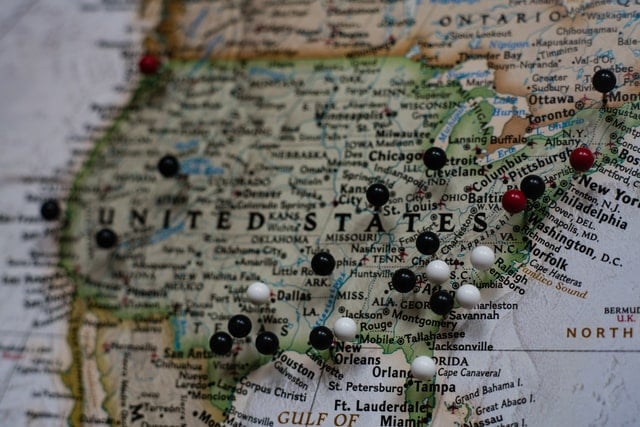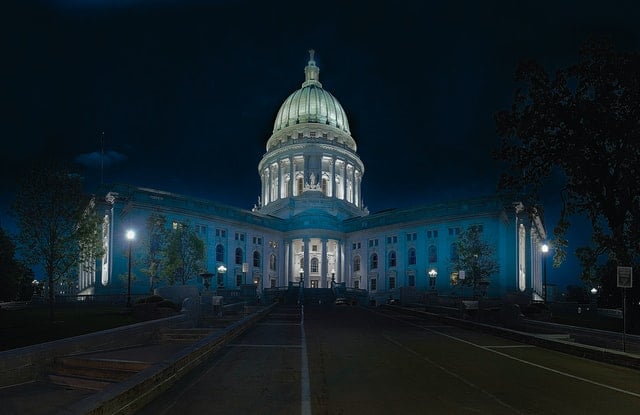No products in the cart.
There has been a pervading uncertainty with regard to the legal status of cannabidiol, or CBD oil, in the U.S., which spans across the entire industry of consumers and manufacturers alike. Is it legal? The answer depends on where you live, as each state operates under their own set of guidelines. Hemp extract companies have been working along very fine lines of technicality as the demand for CBD oil is at an all time high, but they are still vulnerable to the inconsistent application of its vague legal status.
The issue partially stems from the legal distinction of hemp and marijuana, which are both types of cannabis. The 2018 Farm Bill repealed federal restrictions on the production and sale of hemp that contains under 0.3% THC, while still prohibiting commercial marijuana. However, a number of states have enacted their own legislation that allows for medical or commercial marijuana which does contain higher amounts of THC, and this further adds to the legal ambiguity.
State rules also affect what type of cannabis that CBD can be extracted from, and what it can be added to. The constantly shifting legal landscape has led many to hope for more formal federal legislation that will help to define the guidelines regarding these distinctions.
What is CBD Oil?
So what is CBD oil? CBD is one of hundreds of specially shaped molecules that can be derived from cannabis, known as cannabinoids. These cannabinoids are designed to interact with internal cannabinoid (CB) receptors that are found throughout our body.
CB receptors operate as part of the endocannabinoid system, which is a regulatory mechanism that works to modulate imbalances within the body. When certain cannabinoids bind with CB receptors, it triggers the production of specialized neurotransmitters, known as endocannabinoids. The various functions of endocannabinoids will depend on what part of the body they are being released into, as they work by interacting with other local systems.
The cannabinoids in cannabis are able to be extracted into an oil form. Because CBD is the most prevalent compound in hemp, the terms hemp oil and CBD oil are often used interchangeably. However, hemp oil can continue to be extracted until just the singular CBD molecule remains, and this is known as an isolate.

Hemp vs. Marijuana-Derived CBD
As many know, hemp was unfairly stigmatized when recreational marijuana became a primary target for prohibition in the early part of the 20th century. Although hemp and commercial marijuana are both types of cannabis, they vary greatly in the properties that comprise their primary compounds. As opposed to hemp — which has greater amounts of CBD — recreational marijuana is consumed for its tetrahydrocannabinol, or THC, content.
THC is the only compound in cannabis that has the ability to induce psychotropic, or intoxicating, effects, and higher amounts of THC is what determines the value of commercial marijuana. Conversely, industrial hemp growers typically strive to produce plants that contain higher amounts of CBD, as well as a rich profile of additional cannabinoids.
In order for hemp to be federally legal, it cannot contain more than 0.3% THC. Anything more than that makes it a controlled substance, which means it is then regulated by the Drug Enforcement Administration.
Is CBD legal in my state?
Many people want to know: Is CBD legal in my state? This is a potentially tricky question. Although hemp is federally legal, not all states have allowed for the use of its compounds as food and beverage additives. Some states have extremely vague CBD regulations, which aren’t always necessarily enforced, while others have outlawed it completely. There are even different rules regarding traveling with cbd products which you should pay close attention to.
Here is a comprehensive, state-by-state list regarding individual CBD regulations.

| State | Hemp sourced CBD for Any Use | Marijuana sourced CBD for Medical | Marijuana sourced CBD for Rec. |
| Alabama | Legal | Legal | Illegal |
| Alaska | Legal | Legal | Legal |
| Arizona | Legal | Unknown | Illegal |
| Arkansas | Legal | Legal | Illegal |
| California | Legal | Legal | Legal |
| Colorado | Legal | Legal | Legal |
| Connecticut | Legal | Legal | Illegal |
| Delaware | Legal | Legal | Illegal |
| Florida | Legal | Legal | Illegal |
| Georgia | Legal | Legal | Illegal |
| Hawaii | Legal | Legal | Illegal |
| Idaho | Legal | Illegal | Illegal |
| Illinois | Legal | Legal | Legal |
| Indiana | Legal | Illegal | Illegal |
| Iowa | Legal | Legal | Illegal |
| Kansas | Legal | Illegal | Illegal |
| Kentucky | Legal | Illegal | Illegal |
| Louisiana | Legal | Legal | Illegal |
| Maine | Legal | Legal | Legal |
| Maryland | Legal | Legal | Illegal |
| Massachusetts | Legal | Legal | Legal |
| Michigan | Legal | Legal | Legal |
| Minnesota | Legal | Legal | Illegal |
| Mississippi | Legal | Ilegal | Illegal |
| Missouri | Legal | Legal | Illegal |
| Montana | Legal | Legal | Illegal |
| Nebraska | Illegal | Illegal | Illegal |
| Nevada | Legal | Legal | Legal |
| New Hampshire | Legal | Legal | Illegal |
| New Jersey | Legal | Legal | Illegal |
| New Mexico | Legal | Legal | Illegal |
| New York | Legal | Legal | Illegal |
| North Carolina | Legal | Ilegal | Illegal |
| North Dakota | Legal | Legal | Illegal |
| Ohio | Legal | Legal | Illegal |
| Oklahoma | Legal | Legal | Illegal |
| Oregon | Legal | Legal | Legal |
| Pennsylvania | Legal | Legal | Illegal |
| Rhode Island | Legal | Legal | Illegal |
| South Carolina | Legal | Ilegal | Illegal |
| South Dakota | Unclear | Illegal | Illegal |
| Tennessee | Legal | Ilegal | Illegal |
| Texas | Legal | Illegal | Illegal |
| Utah | Legal | Legal | Illegal |
| Vermont | Legal | Legal | Legal |
| Virginia | Legal | Legal | Illegal |
| Washington | Legal | Legal | Legal |
| Washington, D.C. | Legal | Legal | Legal |
| West Virginia | Legal | Legal | Illegal |
| Wisconsin | Legal | Legal | Illegal |
| Wyoming | Legal | Legal | Illegal |
State laws regarding Hemp, Marijuana and Cannabis
You might wonder, what are my state laws regarding hemp, marijuana, and cannabis? For hemp and CBD laws, the best way to find this information would be to go to your state’s agricultural or public health department websites. CBD can fall under two different categories of regulation, because hemp is typically mandated by the state’s agricultural guidelines, but the inclusion of CBD into food and beverages is usually determined by the state’s public health department.
A lot of states are waiting for the FDA to release their own set of guidelines regarding the inclusion of CBD, because most public health departments and food regulators like deferring to FDA requirements. However, many state officials acknowledge that expediency is warranted in this process, as the demand for CBD products continues to be at an all time high.
Although marijuana that contains over 0.3% THC is federally prohibited, many states have now passed individual mandates which allow for its medicinal as well as recreational use. Advocates continue to push for the federal decriminalization of cannabis, regardless of its THC content.
Local Laws
Regional counties and cities can also enact their own local laws regarding hemp, marijuana, and cannabis, so it is always good to be mindful of residential guidelines as well as the state and federal rules. This information is typically available online or by contacting local officials.
It is always good to stay active and informed when it comes to your rights, and the only way to reform legislation is to have an awareness of how the system works. This begins at the individual level, and it is crucial to be educated about your local regulations because those have the ability to affect you the most.
Federal Law and the Farm Bill
There was much cause for hemp activists to celebrate when the 2018 Farm Bill was signed into law, as its federal legalization had been a long time coming. The ignominious inclusion of hemp into the Marihuana Tax Act of 1937 had effectively prohibited its domestic cultivation. Such regulatory action would likely have astounded the founding forefathers, as there had been previous laws in the original colonies that mandated the growth of hemp because it was considered such a valuable commodity.
This would all change when the 2018 Farm Bill effectively altered federal law in order to facilitate the cultivation of hemp. While the only legal distinction between industrial hemp and commercial marijuana is the quantity of THC, many states still opt to determine their own regulations.

Most states are keen to capitalize on the abundant opportunities that the hemp industry can provide. Unfortunately, there are still a few who seem to be wary of allowing any kind of hemp production.
The Farm Bill allows for each state to create their own hemp guidelines, or they can choose to follow the United States Department of Agriculture rules that are being laid out. There are still some points of contention among regulators and farmers regarding certain requirements, including when hemp crops are tested for THC content, and how those crops can be further utilized or disposed of.
Hemp farmers want to have the right to sell crops that may have tested higher in THC for use as textiles or bio-fuel. Unfortunately, this conflicts with current DEA restrictions, which stipulate that “hot” crops are considered a controlled substance and therefore must be destroyed.
Advocates are continuing to support the improvement of regulations and farmer protections that will allow for some flexibility when it comes to these particular issues. The 2018 Farm Bill was a step in the right direction, but further clarification is warranted in order for the industry to stabilize. This will greatly benefit consumers, cultivators, and manufacturers alike.

